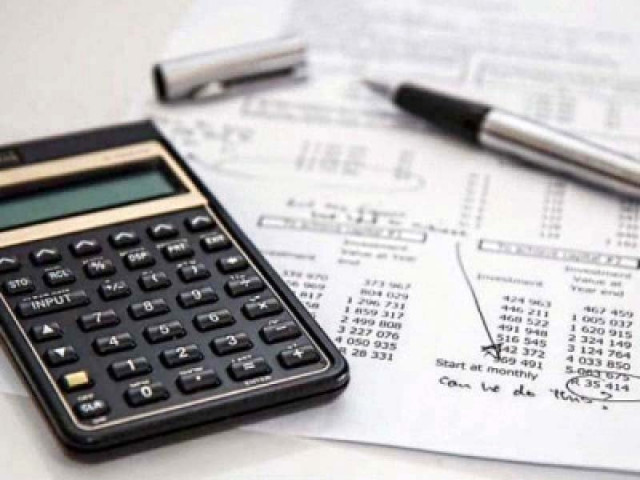10% ‘super tax’ imposed on rich
Stocks plunge 2,053 points after PM’s announcement

The government on Friday announced to impose Rs200 billion in additional taxes on the richest persons and the salaried class, taking the total new taxation to a record over Rs1 trillion introduced in the budget aimed at securing a deal with the International Monetary Fund (IMF).
In his budget windup speech, Finance Minister Miftah Ismail announced to impose from 1-10% ‘one-time super tax’ on the big firms to collect an additional Rs80 billion from them.
Minutes before the finance minister’s speech, Prime Minister Shehbaz Sharif while explaining the rationale behind the aggressive measures in a pre-recorded address to the nation said it was a transformational effort to make the richest pay their share so as to cushion the shock of recent austerity measures to the poor.
The prime minister added three more sectors to the list of industries that would be subject to 10% super tax, taking the number from 10 sectors to 13.
However, the stock market bulls blasted off minutes after the premier’s announcement of the super tax and immediately crashed by losing 2,053 points or 4.8% of the value. Subsequently, the losses were reduced to 1,666 points.
The PM said that the government was faced with two options when it first came to power: call fresh elections or take tough decisions and tackle the sinking economy. “It would have been very easy to leave the public in crisis and become silent spectators like others.”
The finance minister also proposed a 1-4% one-time additional “poverty alleviation tax” on people and firms earning from Rs150 million to over Rs300 million a year for the sake of another Rs80 billion. The total impact of the 1% to 4% additional measure will be Rs120 billion but the government has already proposed a 2% tax for those earning over Rs300 million a year to generate Rs40 billion next year.
The companies falling in this bracket would either pay poverty alleviation tax or the super tax, except those 13 sectors, explained the finance minister. To a question, the minister elaborated that the companies that fall under the turnover tax regime, such as the export-oriented firms, will also pay the super tax based on their profit and losses statement.
The government has also revised the salaried class income tax rates. It withdrew the Rs47 billion relief announced in the budget and instead upward revised the rates to collect additional Rs33 billion from the salaried persons.
On June 10, Ismail had proposed Rs740 billion in additional taxes, including Rs300 billion to be generated through the single largest measure – an increase in petroleum levy rate from Rs30 to Rs50 per litre.
The government had estimated a total of Rs750 billion earning from the petroleum levy – a figure that has now been jacked up in the range of Rs825 billion to Rs850 billion in light of an understanding reached with the IMF.
Highest taxation in a single year
After the fresh announcement, the government is going to impose a minimum of over Rs1 trillion in additional taxes on the people and companies for the fiscal year 2022-23 –the highest taxation in a single year. The coalition government has beaten the PTI government’s record of Rs735 billion in taxation measures through the fiscal year 2018-19 budget.
READ PSX plunges by over 2,000 points after PM Shehbaz announces 'super tax'
Out of over Rs1 billion, the share of the direct taxes is Rs509 billion or slightly over half. The government has taken these measures to secure a staff-level agreement with the IMF that has asked Pakistan to present a primary surplus budget.
The finance minister explained that in order to meet this condition, the government has increased the tax collection target for the Federal Board of Revenue (FBR) to Rs7.470 trillion.
The minister added that the non-tax revenue target has slightly been downward revised to Rs1.935 trillion –a reduction of Rs65 billion compared with the June 10 budget. It has still retained the Rs30 billion collection target from the Gas Infrastructure Development Cess, as against the earlier proposed figure of Rs200 billion.
The IMF had objected to the inclusion of the GIDC collection target in the budget.
The share of the provinces in the federal taxes will increase from an earlier announced figure of Rs4.1 trillion to Rs4.37 trillion, said the finance minister.
The federal budget deficit target has been set at Rs4.55 trillion or 5.8% of the GDP. The overall budget deficit target is now Rs3.8 trillion or 4.8% of the GDP, according to the finance minister.
Ismail also said that in order to collect tax from the rich, the government has proposed to impose from 1% to 4% super tax on all firms, increasing their total rate to 33%.
He said that the government has also picked 13 sectors that made windfall gains and it has decided to impose a 10% super tax on them for one year, taking their total income tax rate to 39%.
He said that large-scale industries have been targeted to shore up revenues for supporting the country's poor amid rising inflation.
The government has imposed a 10% super tax on banks, cement, iron & steel, sugar, oil and gas, fertilizers, LNG terminals, textile, banking, automobile, cigarettes, beverages, chemicals and airlines, the finance minister added.
‘Hard to believe promises’
Meanwhile, the Pakistan Business Council cast suspicions on the finance minister's promises and took to Twitter to say: “Based on the past history, here are some hard to believe promises made now in the budget: this is a one-time tax, tax refunds will be made promptly."
The finance minister said that high-net-worth individuals will also be subject to a “poverty alleviation tax”, to be charged at the rate of 1% to 4%.
Those whose annual income exceeds Rs150 million will be subject to 1% tax; for Rs200 million, 2%, Rs250 million 3%; and Rs300 million will be taxed at 4% of their income.
PM Shehbaz vowed to collect due taxes from the people. “The teams have been formed to go all out to collect taxes and assistance will be sought from all constitutional institutions,” the premier said.
Meanwhile, finance minister Ismail said that fixed income tax has also been introduced for jewellers, builders, restaurants and automobile dealers.
The jewellers doing business in less than 300 square feet shop will pay Rs40,000 fixed income tax, those having bigger sized shops will pay 3% sales tax as against the current 17% rate, he added. In the budget, the government has already announced to charge Rs3,000 to Rs10,000 fixed per month income tax from the retailers.
He also restored a 50% capital gains tax exemption for the war-wounded and families of the martyred soldiers and bureaucrats.
Minister for Water Resources Syed Khursheed Shah urged the Finance Minister to increase the tax burden of the tobacco sector.
The cabinet members appreciated the efforts put by the Finance Minister to avert default.
The finance minister said that during the outgoing fiscal year the federal budget deficit will be Rs5.31 trillion and the overall deficit will be Rs4.7 trillion. He criticised the former premier Imran Khan for increasing the debt of the country to nearly Rs45 trillion during his term.



















COMMENTS
Comments are moderated and generally will be posted if they are on-topic and not abusive.
For more information, please see our Comments FAQ